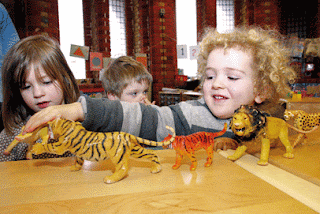The EYFS card, Play and Exploration 4.1, states that: 'Children's play reflects their wide-ranging and varied interests and preoccupations. In their play, children learn at their highest level. Play with peers is important for children's development.' Practitioners therefore need to understand and engage with the concepts that children are already interested in if they are to support their development and learning effectively.
 |
| Positioning Schema typical behaviour is lining things up this is closely linked to trajectory |
Children's individual needs should be frequently observed and catered for in all six areas of learning. The EYFS (2007, p12) reminds practitioners that it is their daily, ongoing observations of children's interests that will significantly inform both planning and provision: 'No plan written weeks in advance can include a child's interest in transporting small objects in a favourite blue bucket.' So, if practitioners are to plan and build on child-initiated activities that will extend a child's knowledge, skills and conceptual understanding in a meaningful way, they have got to be aware of the child's schematic interests.
 |
| Transforming Schema children have a fascination with how things change |
In the context of a play-based framework, a sound knowledge of schemas can be used to build on child-initiated activities. 'Children learn best through physical and mental challenges. Active learning involves other people, objects, ideas and events that engage and involve children for sustained periods.' (EYFS card, Active Learning 4.2). It is often through child-initiated activities that children display their real areas of interest. A practitioner's effort to build on these areas of interest gives children the time necessary to explore possibilities and similarities of abstract concepts, before they are able to assimilate new knowledge into their cognitive structures. And, a concept that is familiar enough will certainly be actively applied during play.
Stella Louis works as an early years consultant for the London Borough of Southwark.
No comments:
Post a Comment